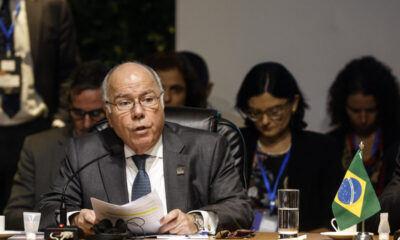International
Milei presents package of laws to Congress on day of demonstrations against him

December 28 |
The President of Argentina, the ultra-liberal Javier Milei, presented this Wednesday to Congress a package of laws, texts which contemplate the deregulation of the economy after the decree approved by the President last week, measures which provoked demonstrations against him and which so far resulted in six arrests.
Convened by the main labor centers, thousands of people gathered in front of the Palace of Tribunals in Buenos Aires to demand that the decree published last week to reform or repeal more than 300 regulations be declared unconstitutional.
“We do not question the legitimacy of President Milei, but we want him to respect the division of powers. Workers have the need to defend their rights when there is an unconstitutionality,” Gerardo Martínez, secretary general of the construction union, one of those who led the demonstration which was also joined by social organizations, told the press.
This initiative will come into force on Friday, within the framework of a strong fiscal adjustment that has already implied a devaluation of the peso of more than 50%.
“We have come to say no to the decree because it takes away one of the powers of the State, the Congress”, said to AFP Adrian Grana, one of the demonstrators for whom the presidential initiative “is a decalogue to favor the powerful to the detriment of the people”.
The demonstration developed peacefully until after midday, when a group of people had small altercations with police officers who were trying to prevent them from closing a street.
Six demonstrators were arrested, according to the press.
The Minister of the Interior, Guillermo Francos, delivered to parliament a draft “omnibus law”, which includes a reform of the electoral system and the tax system, in addition to allowing the privatization of public companies, among other measures.
“We promote these reforms in the name of the May Revolution of 1810 and in defense of the life, liberty and property of Argentines,” Milei wrote in his X account when announcing the legislative project that completes his decree.
Congress opened extraordinary sessions on Tuesday to deal with these laws.
Milei, who took office on December 10 with the promise to reduce State spending, has already announced that he will not renew the contracts of 7,000 public employees.
The President hopes that the adjustment of public spending will reach the equivalent of 5% of the Gross Domestic Product (GDP).
The decree limits the right to strike, modifies labor agreements and the system of severance pay, also repeals laws protecting consumers against abusive price increases when annual inflation exceeds 160% and 40% of the population live in poverty.
“Today we are going to court, but there is another chapter focused on the Congress that will have to give a deep debate” on the content of the decree, said Gerardo Martinez.
The union leader urged the government to “form a collective tripartite dialogue table with employers and unions, as other countries that have gone through a severe adjustment have had”.
The Congress, where the ruling party is the third minority, can invalidate the decree, but this would take several months.
The initiative repeals the retirement mobility law and the law regulating rents, frees the price of bank commissions and punitive rates for debts and allows sports clubs to become corporations.
“It is destructive of all labor rights. The Argentine people elected Milei as president of the Nation, not as emperor,” criticized Martín Lucero, a 45-year-old teacher who came from Rosario to support the march.
Last week the courts opened a file to analyze a collective appeal against the decree.
“All the measures go right through me, they are going to starve us,” said Sofía Julián, a 33-year-old employee who came to the march from the southern outskirts of Buenos Aires. “We are united and organized and we are going to continue fighting to oppose the decisions taken by this government against the Argentine people,” she added.
International
Dominican ‘False Hero’ Arrested for Faking Role in Nightclub Collapse That Killed 231

A man identified as Rafael Rosario Mota falsely claimed to have rescued 12 people from the collapse of the Jet Set nightclub in Santo Domingo—a tragedy that left 231 people dead—but he was never at the scene.
Intelligence agents in the Dominican Republic arrested the 32-year-old man for pretending to be a hero who saved lives during the catastrophic incident, authorities announced.
Rosario Mota had been charging for media interviews in which he falsely claimed to have pulled survivors from the rubble after the nightclub’s roof collapsed in the early hours of April 8, during a concert by merengue singer Rubby Pérez, who was among those killed.
“He was never at the scene of the tragedy,” the police stated. The arrest took place just after he finished another interview on a digital platform, where he repeated his fabricated story in exchange for money as part of a “media tour” filled with manipulated information and invented testimonies.
“False hero!” read a message shared on the police force’s Instagram account alongside a short video of the suspect, in which he apologized: “I did it because I was paid. I ask forgiveness from the public and the authorities.”
Central America
Nicaraguan Exiles to Mark 7th Anniversary of 2018 Protests with Global Commemorations

The Nicaraguan opposition in exile announced on Thursday that it will commemorate the seventh anniversary of the April 2018 protests against the government of President Daniel Ortega and his wife, Rosario Murillo, with events in Costa Rica, the United States, and several European countries.
The commemorative activities—which will call for justice for the victims, as well as freedom and democracy for Nicaragua—will include religious services, public forums, cultural fairs, and other public gatherings, according to official announcements.
In April 2018, thousands of Nicaraguans took to the streets to protest controversial reforms to the social security system. The government’s violent response quickly turned the demonstrations into a broader call for the resignation of President Ortega, who is now 79 and has been in power since 2007.
The protests resulted in at least 355 deaths, according to the Inter-American Commission on Human Rights (IACHR), although Nicaraguan organizations claim the toll is as high as 684. Ortega has acknowledged “more than 300” deaths and maintains the unrest was an attempted coup d’état.
International
Arsenal stun Real Madrid at the Bernabéu to reach Champions League semifinals

Arsenal enjoyed a “historic night” on Wednesday after defeating Real Madrid 2-1 at the Santiago Bernabéu, knocking them out of the Champions League quarterfinals, midfielder Declan Rice said.
“It’s such a special night for this club, a historic night for this club,” said Rice, who scored twice in the first leg in London, speaking to TNT Sports.
The English international was named Man of the Match in both legs — the 3-0 win in London and the second leg in Madrid.
“It’s amazing. I knew we were on an upward trajectory and we’ve done incredibly well in this competition. We deserve it and we have full confidence in our coach. Reaching the semifinals is unbelievable,” Rice added.
-

 International5 days ago
International5 days agoNightclub Collapse in Dominican Republic Claims 226 Lives
-

 International5 days ago
International5 days agoVenezuela accuses Guyana of “warlike intentions” after UK defense deal
-

 Central America3 days ago
Central America3 days agoHonduran Police Offer $135K for Tips Leading to the Arrest of Romeo Vásquez
-

 Central America2 days ago
Central America2 days agoPetro questions Ecuador’s vote, cites reports of military control and arrests
-

 International3 days ago
International3 days agoMPV Denounces Electoral Blockade as Secretary-General is Disqualified for May Elections
-

 International1 day ago
International1 day agoArsenal stun Real Madrid at the Bernabéu to reach Champions League semifinals
-

 International3 days ago
International3 days agoMaduro Plans Major Workers’ March on May 1st to Defend Venezuela’s Freedom
-

 International1 day ago
International1 day agoBogotá residents line up for yellow fever vaccine amid national alert
-

 International1 day ago
International1 day agoMexico refuses to restore ties with Ecuador while Noboa remains in office
-

 International1 day ago
International1 day agoDeSantis’ immigration crackdown sparks alarm in Venezuelan Communities in Doral
-

 International2 days ago
International2 days agoColombia: Search continues for missing limb of italian scientist found dismembered
-

 International8 hours ago
International8 hours agoDominican ‘False Hero’ Arrested for Faking Role in Nightclub Collapse That Killed 231
-

 Central America8 hours ago
Central America8 hours agoNicaraguan Exiles to Mark 7th Anniversary of 2018 Protests with Global Commemorations





















































